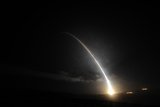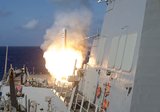Turkey court rejects appeal to free Greek soldiers
A Turkish court 5 March rejected a request for the release of two Greek soldiers arrested last week for illegally entering the country, local media reported.
The pair were arrested on 2 March for entering a prohibited military zone in the northern province of Edirne.
Turkish media initially reported that the two men were arrested for 'attempted military espionage' but Greek authorities denied it.
The soldiers told prosecutors last week that they had erroneously entered through a border crossing after 'following footprints in the snow in an attempt to stop migrant smuggling', local media reported.
Turkish Deputy Prime Minister Bekir Bozdag said on 5 March that prosecutors wanted the two soldiers detained for attempted military espionage and entering a forbidden military zone, but the judge ordered their arrest only on the second charge.
The Greek army said the lieutenant and sergeant lost their way in poor weather while patrolling around the Evros river that divides the two nations.
Greek Foreign Minister Nikos Kotzias, speaking before the court's decision, urged its NATO ally Turkey 'to apply the provisions of international law and not turn a routine procedure into a major legal and political problem'.
Relations between Ankara and Athens are tense over a number of issues including the Greek failure to extradite eight Turkish troops who escaped Turkey by helicopter on the night of the July 2016 attempted overthrow of President Recep Tayyip Erdogan.
But Bozdag told reporters in Ankara 'there was no question of an exchange' for the Turkish military personnel, echoing comments made at the weekend by Athens.
'We are not at war with Turkey to conduct an exchange of prisoners,' junior foreign minister Yiorgos Katrougalos said 3 March.
Turkish and Greek vessels have also in the last weeks twice collided off Aegean islets that have been a historic flashpoint in a long-running demarcation dispute.
Tensions are also high over Cyprus as Turkey promises to prevent attempts by the internationally recognised Greek Cypriot government to exploit oil reserves off the Mediterranean island.
The northern part of the island is still occupied by Turkish troops following the 1974 invasion in response to an Athens-inspired coup aimed at uniting it with Greece.
More from Defence Notes
-
![US lawmakers warn that “more military spending is absolutely necessary” to ensure Pentagon’s readiness]()
US lawmakers warn that “more military spending is absolutely necessary” to ensure Pentagon’s readiness
The US Congress has raised concerns about how inflation rates and cuts in main acquisition programmes could affect the US military.
-
![Can the US overcome Russian and Chinese nuclear capabilities?]()
Can the US overcome Russian and Chinese nuclear capabilities?
Washington’s ageing inventory and the pace Moscow and Beijing have been modernising their capabilities put in check the US Nuclear deterrence.
-
![US FY2024 funding package passes as China closes military capability gap]()
US FY2024 funding package passes as China closes military capability gap
The Pentagon has been operating under temporary funding since October 2023, which has impacted its main acquisition and development programmes, increasing the capability gap between the US and China.
-
![NATO outlines future challenges as Ukrainian funding from US stalls]()
NATO outlines future challenges as Ukrainian funding from US stalls
In 2023, defence spending increased by an unprecedented 11% across European NATO countries and Canada. Since 2014, the group has spent an additional US$600 billion on defence.
-
![US Pentagon to reduce investments in main acquisition programmes over FY2025]()
US Pentagon to reduce investments in main acquisition programmes over FY2025
The DoD requested nearly US$850 billion to fund operations over the next fiscal year. Despite the amount being 1% higher than the FY2024 budget request, it has not covered the 3% inflation rate, which could impact the DoD’s main programmes in the medium and long term.























